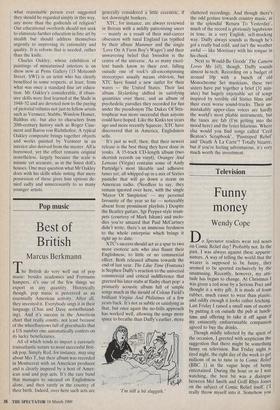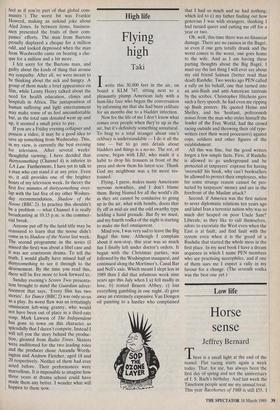Television
Funny money
Wendy Cope D. Spectator readers wear red noses on Comic Relief day? Probably not. In the past, I was always against these appurte- nances. A way of telling the world that the wearer is supposed to be funny, they seemed to be sported exclusively by the unamusing. Recently, however, my atti- tude has begun to change. At Christmas I was given a red nose by a Serious Poet and thought it a witty gift. It is made of foam rubber, much easier to wear than plastic, and oddly enough it looks rather fetching. Last Friday I raised a small sum of money by putting it on outside the pub at lunch- time and offering to take it off again if my eminently embarrassable companion agreed to buy the drinks.
Though mildly infected by the spirit of the occasion, I greeted with scepticism the suggestion that there might be something funny on television. But Friday night is tired night, the right day of the week to get millions of us to tune in to Comic Relief (BBC 1) in the vague hope of being entertained. During the hour or so I was watching, the best bit was a dialogue between Mel Smith and Griff Rhys Jones on the subject of Comic Relief itself. CI really throw myself into it. Somehow you
feel as if you're part of that global com- munity.') The worst bit was Frankie Howerd, making an unkind joke about Aled Jones. In between items, business- men presented the fruits of their com- panies' efforts. The man from Burtons Proudly displayed a cheque for a million odd, and looked depressed when the man from Woolworths came on bearing a che- que for a million and a bit more.
I felt sorry for the Burtons man, and guilty about the kinds of thing that arouse my sympathy. After all, we were meant to be thinking about the sick and hungry. A group of them made a brief appearance on film, while Lenny Henry talked about the need for health education, clinics and hospitals in Africa. The juxtaposition of human suffering and light entertainment may make some of us feel uncomfortable but, as the total sum donated went up and up, it seemed a small price to pay.
If you are a Friday evening collapser and possess a video, it may be a good idea to save up something from Wednesday. This, in my view, is currently the best evening for television. After several weeks' thoughtful viewing, I have decided that thirtysomething (Channel 4) is inferior to LA Law. Furthermore, I have yet to talk to a man who can stand it at any price. Even so, it still provides one of the brighter hours of my television week. In theory the first five minutes of thirtysomething over- lap with the last five of my other Wednes- day recommendation, Shadow of the Noose (BBC 2). In practice this shouldn't be a problem — what Channel 4 is really broadcasting at 10.15 p.m. is the commer- cial break.
Anyone put off by the lurid title may be reassured to learn that the noose didn't come in to Shadow of the Noose last week. The second programme in the series (I missed the first) was about a libel case and it was ace courtroom drama. To tell the truth, I would gladly have missed half of thirtysomething to see it through to the denouement. By the time you read this, there will be five more to look forward to.
Sunday evening's Screen Two presenta- tion brought to mind the Guardian adver- tisement that says, 'Every film has two stories'. Ice Dance (BBC 2) was only so-so as a play. Its worst flaw was an irritatingly omniscient left-wing granny, who would not have been out of place in a third-rate soap. Mark Lawson of The Independent has gone to town on this character so splendidly that I daren't compete. Instead I will tell you the story behind the produc- tion, gleaned from Radio Times. Skaters were auditioned for the two leading roles and the producer chose Amanda Worth- ington and Andrew Fletcher, aged 18 and 20 respectively. Neither of them had ever acted before. Their performances were marvellous. It is impossible to imagine how three years at drama school could have made them any better. I wonder what will happen to them now.



























































 Previous page
Previous page